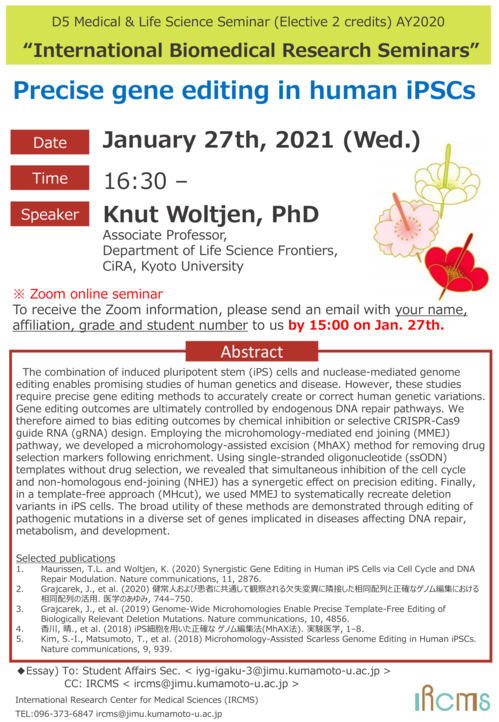- HOME
- News & Events
- [Jan.27] D5 Medical & Life Science Seminar-Dr. Knut Woltjen
News & Events
[Jan.27] D5 Medical & Life Science Seminar-Dr. Knut Woltjen
January 20 2021
The "D5 Medical & Life Science Seminar" course will be offered by International Research Center for Medical Sciences (IRCMS). It will run from April 2020 to March 2021, with lectures given by scientists who are affiliated with IRCMS or in collaboration with researchers at IRCMS. The lectures will be given once a month, in English, and by leading scientists in the relevant research field. Students will be taught: 1) how normal physiological functions are maintained in the human body; 2) how these systems become abnormal under certain pathophysiologic conditions; 3) why stem cells are important in animal development and homeostasis; 4) how stem cell-based approaches can help us understand disease mechanisms and find potential cure for diseases related to stem cell malfunction (e.g., cancer, aging).
Date : January 27, 2021 (Wednesday)
Time : 16:30 -
* Zoom online seminar
To receive the meeting ID / Password, please send an email to
ircms*jimu.kumamoto-u.ac.jp by 15:00 on January 27, 2021.
(Change * to @ when you send an email.)
Please include your name, affiliation, grade and student number in your email.
Speaker : Knut Woltjen, PhD
Associate Professor,
Department of Life Science Frontiers,
Center for iPS Cell Research and Application (CiRA),
Kyoto University
Title : Precise gene editing in human iPSCs
Abstract :
The combination of induced pluripotent stem (iPS) cells and nuclease-mediated genome editing enables promising studies of human genetics and disease. However, these studies require precise gene editing methods to accurately create or correct human genetic variations. Gene editing outcomes are ultimately controlled by endogenous DNA repair pathways. We therefore aimed to bias editing outcomes by chemical inhibition or selective CRISPR-Cas9 guide RNA (gRNA) design. Employing the microhomology-mediated end joining (MMEJ) pathway, we developed a microhomology-assisted excision (MhAX) method for removing drug selection markers following enrichment. Using single-stranded oligonucleotide (ssODN) templates without drug selection, we revealed that simultaneous inhibition of the cell cycle and non-homologous end-joining (NHEJ) has a synergetic effect on precision editing. Finally, in a template-free approach (MHcut), we used MMEJ to systematically recreate deletion variants in iPS cells. The broad utility of these methods are demonstrated through editing of pathogenic mutations in a diverse set of genes implicated in diseases affecting DNA repair, metabolism, and development.
Selected publications:
- Maurissen, T.L. and Woltjen, K. (2020) Synergistic Gene Editing in Human iPS Cells via Cell Cycle and DNA Repair Modulation. Nature communications, 11, 2876.
- Grajcarek, J., et al. (2020) 健常人および患者に共通して観察される欠失変異に隣接した相同配列と正確なゲノム編集における相同配列の活用. 医学のあゆみ, 744-750.
- Grajcarek, J., et al. (2019) Genome-Wide Microhomologies Enable Precise Template-Free Editing of Biologically Relevant Deletion Mutations. Nature communications, 10, 4856.
- 香川, 晴., et al. (2018) iPS細胞を用いた正確な ゲノム編集法(MhAX法). 実験医学, 1-8.
- Kim, S.-I., Matsumoto, T., et al. (2018) Microhomology-Assisted Scarless Genome Editing in Human iPSCs. Nature communications, 9, 939.
Flyer:

